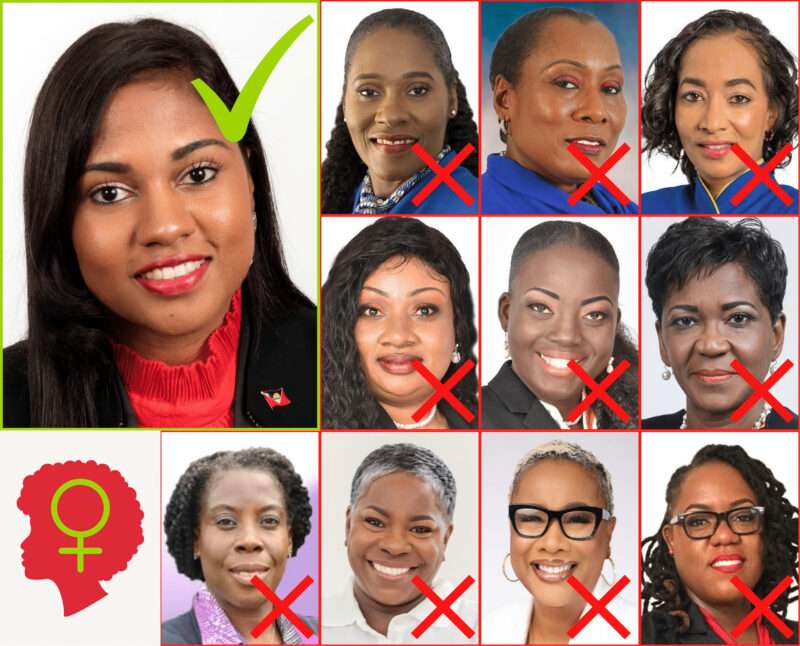You can now listen to Antigua News articles!

The Sausage Party in Antiguan Politics: Fixing the Gender Gap
By Kieron Murdoch | Opinion Contributor
The gender gap in the Lower House of Parliament is difficult to miss. In the last election, just one of the seventeen candidates successfully elected was female. Moreover, of the eleven female candidates who ran in the election either on a Labour ticket, a Progressive ticket, an Alliance ticket, or as independents, only one was successful.
The first question we ought to ask is whether we have a problem. You might be inclined to wonder whether having a high, low, or even proportion of female MPs in Parliament makes any difference in the governance and direction of our society. Does female representation matter? We think it does. But understanding why necessitates that we take a broader view of gender relations in society than merely considering what goes on in politics.
We should consider that across societies historically, women have enjoyed less power than men, less ownership than men, less economic opportunity than men, less bodily autonomy than men, fewer rights and freedoms than men, and less access to decision-making roles than men.
While the scale of those inequalities has lessened dramatically in many parts of the world, gender inequality still presents itself in various ways, sometimes subtly, sometimes overtly, often driven by unspoken attitudes, expectations and norms perpetuated by both men and women as it relates to the roles that males and females assume in society.
So, yes, it is important that there be adequate female representation in Parliament. This is a means to ensure that political decisions adequately reflect women’s needs and preferences, particularly in a society such as ours that is, like many other liberal democracies, working to reduce the inequalities that women and girls face. But if female representation is important, why then is it that so few women get elected?
To start, we must acknowledge that the people who get elected to Parliament do not drop out of the sky, but are recruited and put forward by political parties. That is how our political system works. Organised political parties put forward competing candidates and competing agendas for the public to vote on to approve a group of representatives who can then endorse a government (Cabinet).
The real question is not why are so few women elected to Parliament, but rather, why so few women are approved, endorsed, or appointed as candidates within the two main political parties that actually stand a chance at winning elections: the Antigua and Barbuda Labour Party (ABLP) and the United Progressive Party (UPP). Needless to say, if a larger proportion of candidates on either side were female, then the statistical likelihood of more women being elected would increase tremendously.
In the last election, only 4/17 Labour candidates were women: Maria Browne, Gail Christian, Samantha Marshall and Knacyntar Nedd. It is interesting to note that following the election, the ABLP has found male replacements in the seats contested by Gail Christian and Samantha Marshall in the persons of Michael Joseph and Dwayne George respectively.
Meanwhile, in terms of female representation on the rest of the Labour slate, there are more men than women filling the gaps. Sir Robin Yearwood is being replaced by another male candidate in the person of Randy Baltimore and there were no women in the primary that landed Baltimore on the ticket.
In All Saints West, which was lost by Labour MP Dr. Michael Browne (who has vanished from public life) in 2023, it was a toss-up between two male candidates – Lamin Newton and Regis Burton – until the sitting male UPP MP there, Anthony Smith, left his party and agreed to join the Labour Cabinet, prompting the party to abort its search for a candidate and reserve the seat for him in th next election.
In All Saints East and Saint Luke, Lamin Newton was crowned candidate ahead of other contenders, such as the ABLP’s Jermaine P. Lewis, a woman who had been eyeing that constituency for some time. In St. George, the names of those interested include Joel Rayne, Bakesha Francis-James, Michael Freeland and Clement Antonio. Also, Labour’s Dean Jonas who was unseated there in the last election, has not said that he plans to retire just yet.
In the example above of St. George, note how statistically weak the female proportion of interested candidates is in relation to the males. There is a male incumbent who may try to retain the nomination, then at least three more males, and just one female. In scenarios like this where the majority of interested candidates are male, the statistical likelihood of a female winning the nomination diminishes.
We could go through the entire list of ABLP seats that are up for a new candidate but there is no need, as the pattern repeats itself: the majority of known prospective candidates who have declared their hand are either mostly male or wholly male in each case.
Moving over to the UPP, we can observe that just 3 of 16 UPP candidates in the last election were women: Dr. Cleon Athill, Pearl Quinn-Williams, and Gladys Potter. None were successful. Dr. Athill later left the party altogether while Potter has more recently aborted her bid for re-election to the party ticket in St. John’s Rural South. Another woman, Jermaine Edwards, recently made headlines by withdrawing from the UPP primary there, citing frustration with the party’s handling of the process.
Still on the UPP, we wrote recently about former Senator Shawn Nicholas and the fact that despite appearing to be one of the most poised and capable candidates on the UPP slate overall in the last ten years (she ran in 2014 and in 2018) she never managed to get elected to the Lower House, and lost out to Sherfiled Bowen when a more winnable seat in St. Phillip’s South was available ahead of the 2023 general election.
Joanne Massiah is worth mentioning as well. A highly capable politician and someone once poised to lead the UPP into a new era before she withdrew from a leadership race in 2015 citing unfairness with the process, she was outmanoeuvred by Harold Lovell, who went on to lose two subsequent elections as party leader and failed in two successive bids (2018, 2023) to win back his seat lost in 2014. Massiah as replaced by a male candidate, who is currently the UPP Leader and Leader of the Opposition, Jamale Pringle.
In the 2023 general election, the Democratic National Alliance (DNA) also had a paltry offering when it came to female representation. Like the UPP, only 3 of its 16 candidates were women: Joanne Massiah, Chaneil Imhoff and Tecla Thomas. In regards to the Barbuda Peoples Movement (BPM), MP Trevor Walker, a male, has been their candidate for several cycles now.
We can see in all the above that within political parties, fewer women end up being candidates and it would appear at least that fewer women come forward wanting to be candidates as compared to the number of men. Also, at times female candidates (just like male candidates) get sidelined during the often bitter and unfair contests to be on the ticket. But, given that female representation is already low, when this happens to a woman, it appears to have dire impacts on the prospects for female political leadership and the success of women in national elections.
It is also important to note that within political parties, the determination as to which contender ultimately receives the green light to become the candidate in a constituency often rests with elements within that party’s political leadership. If the existing political leadership is male-dominated, then it may be the case that there is a sort of boys club emerging.
A boys’ club is an informal, male-dominated social network that can be toxic and exclusive of women and other marginalized groups. The term is often used to refer to power circles with a history of male control. It can imply that elites within the circle or field are drawn from a small pool of people who are well-acquainted with each other, or at the least, are recruited from within such a pool.
In our case, suggesting that a boys’ club exists in some way implies that male party leaders and male power brokers within political parties are perhaps more likely to favour their male associates within the political field than to put their support behind a female candidate. We may be wrong, but it is a point worth considering. Are male leaders in political parties as equally inclined to support competent females for positions as candidates as they support other males?
Some might argue that when seeking powerful allies, men tend to surround themselves with other powerful men, whereas they more surround themselves with women when they are seeking loyal functionaries and trusted aides. Sometimes, the women who tend to surround powerful men are chosen by those men because they adulate them, or are effective, but not always because they are seen by those men as worthy equals deserving of support to stand should to shoulder.
Here’s an interesting question: How many female candidates as compared to male candidates has Prime Minister Gaston Browne publicly gone to bat for within the Labour Party during his leadership? One notable case is that of his wife, Maria Browne, in Rural East ahead of the 2018 election. Are there other examples?
What about on the UPP side? When given the opportunity, to what extent has the current or former Leader of the UPP been equally as willing to support female candidates as compared to males?
But then, we run into the problem of the DNA. Here, you had a party led by a seasoned female politician, and still, the overwhelming majority of its candidates were male. Perhaps it is too simple therefore to suggest that boys’ clubs are what is responsible or chiefly responsible for the underrepresentation of females on slates, and ultimately, in Parliament.
So, why are women not stepping forward? Some will say that women are not as politically ambitious and hungry for power as men. We do not necessarily agree with that. It may simply be that barriers of various sorts are hindering equal participation. Notably, many women occupy positions of executive power on the basis of a political appointment and there is no question of whether women have the capacity to govern as effectively as men.
But while governance is concerned with making good decisions which effectively improve the well-being of society through public services and regulation of all our activities and resources, politics is concerned with who achieves the power to govern, and how that that power is achieved and maintained.
Here it seems, there are far fewer women than men who are either interested in or capable of achieving and maintaining power itself. We should also acknowledge,, however, that the extent to which women in society feel inclined to seek political power may be influenced by the existing patterns of male-dominated political leadership to which both men and women have long been accustomed.
We should also consider the reality that when it comes to family life, men are far freer to pretend that they don’t have children and pursue their ambitions with all of their time. Some male politicians have more children than they care to acknowledge. Women on the other hand bear the brunt of the social and moral expectation that they will not abandon their families and will pay greater attention to raising their children.
Others will argue that women are less willing to endure the mud-slinging of politics – the name-calling, rumours, smear, talk of personal life, and shaming that is the domain of the rabid elements of political parties. The development of our language within the context of an unequal society means that there are more words for denigrating women than there are for men. The lexicon for attacking a woman for being a woman is far more diverse because the societies in which that lexicon developed have been dominated by male power.
Perhaps too, the expectations placed on women as to how they should appear, how they should dress, how they should present themselves in public, how they should speak, when they should shout, how they should disagree, and what tone they should take, are far more burdensome and complex than we might like to acknowledge.
Whatever the case may be, we must accept that we are not well served by the persistent underrepresentation of women in Parliament, and thereby in the governance of the country. We also not well served by the underrepresentation of women across parties in terms of candidacy. Changing this norm begins with the people, and how they view that underrepresentation, and must continue with changes within political parties, which is where politicians are recruited.
It can no longer be acceptable for a party to put forward a slate with 4/17 or 3/16 candidates being female. That sort of thing ultimately results in us having a Parliament with 1 female MP among a total of 17 members. That’s unacceptable. But it is equally incumbent on more women in politics to take up the challenge of seeking power for themselves and what good they may do with it, rather than being absorbed into the entourage of a male politician.
About the writer:
Kieron Murdoch is an opinion contributor at antigua.news. He worked as a journalist and later as a radio presenter in Antigua and Barbuda for eight years, covering politics and governance especially. If you have an opinion on the issues raised in this editorial and you would like to submit a response by email to be considered for publication, please email staff@antigua.news.
























Love the work it up
Interesting. But not really. I would say try to avoid the common contentious agendas of the day that you see out there in so called 1st world countries. Why not strive for “equality” in construction? There is more demand in that industry, and the chances of you corrupting your soul are much less. Focus instead on cleaning up the garbage in your streets, and creating a diversification of industry that can foster a substantial increase in GDP. Leave the meaningless platitudes to countries that can afford it……..
Well, as a woman, I think you presented many of the known reasons why women don’t enter politics – too much mudslinging, children to raise etc. I don’t know if it’s realistic or even desirable to have equality in numbers in that sector though. I’m more concerned with whether the decisions made are good for women than who is making the decisions. In my experience female leaders don’t necessarily do more for women’s issues than male leaders. Sometimes they want to prove they are just like the men so they deliberately avoid advancing ideas that are good for women. Sometimes males advance female-friendly policies more. On the other hand some female leaders go too far on women’s issues and push for all kinds of social changes that actually destabilize families and society. Men keep that in check from going too far with the so-called progressive stuff. The issues that I want all leaders to work on are food, clothing, shelter, community activities etc. Women’s voices could be helpful not so much at the top but on boards etc. to help with refining details. E.g. because women take care of children more, their ideas should be included when designing social housing, healthy food systems, wholesome community activities etc. So, I would like to see 50% women on boards etc. but I don’t care about having 50% women in politics.
Lol hahahaha. The sausage party lol is funny. They getting sausagr from who? Lol